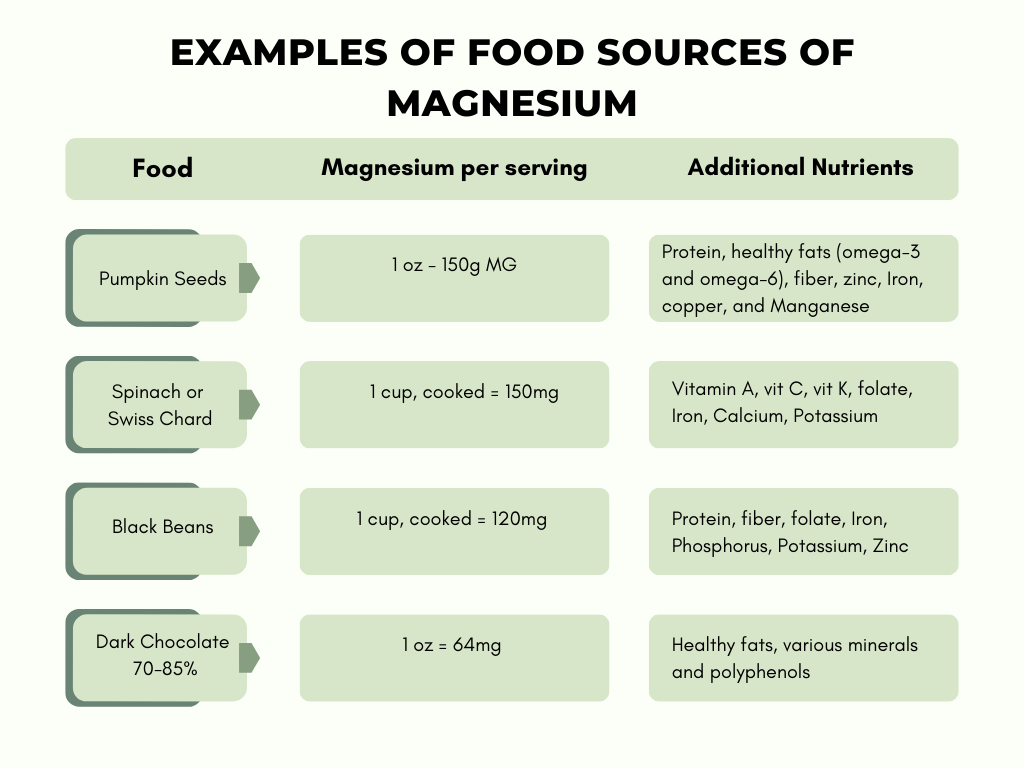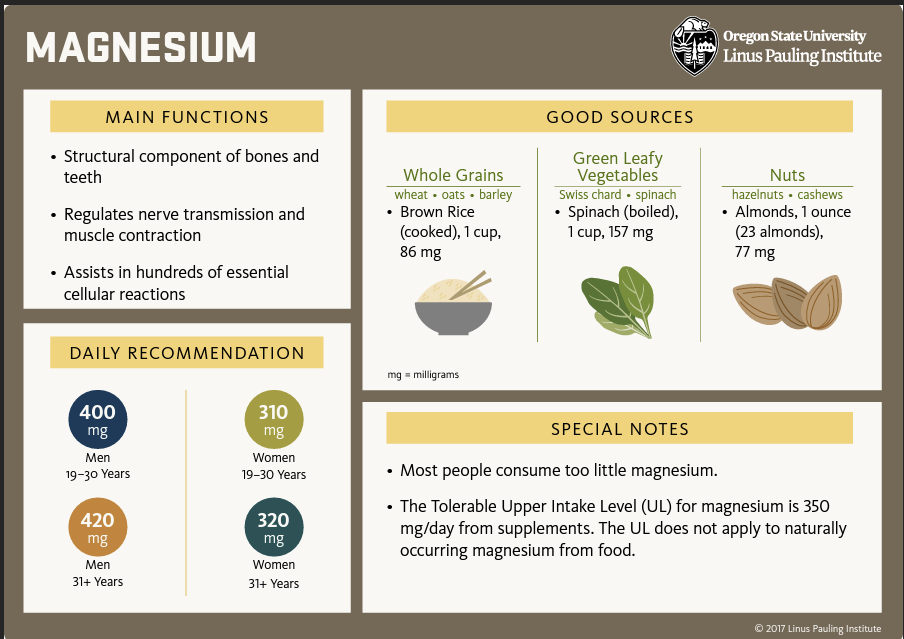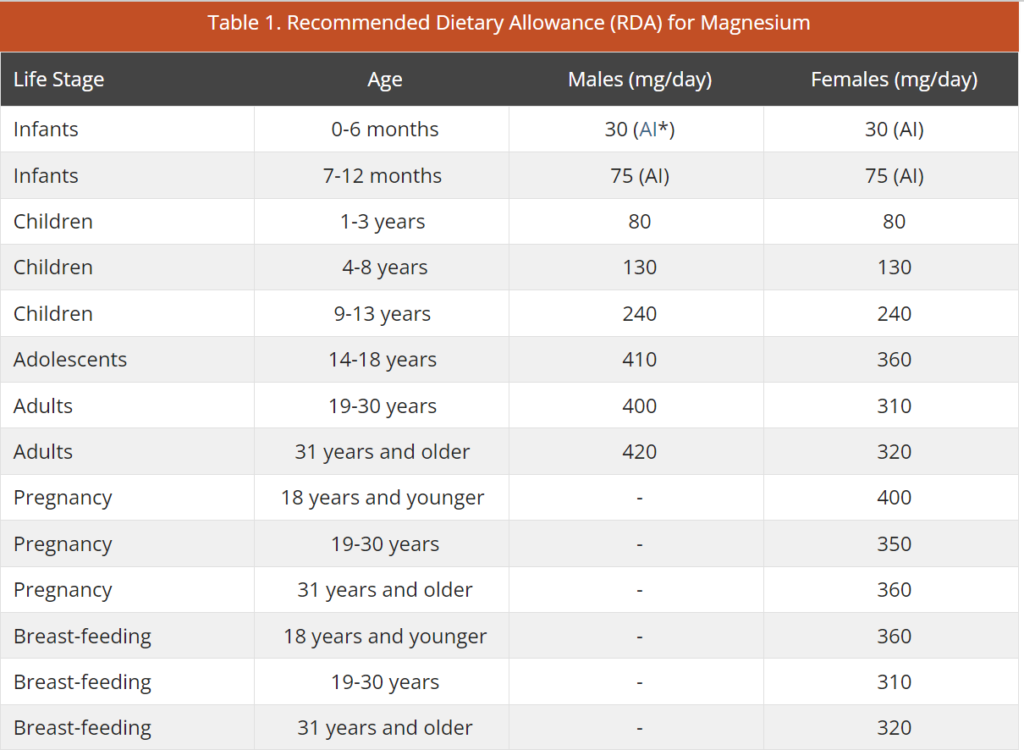The Ultimate Guide to a Maximizing Magnesium
Mineral balance plays a crucial role in promoting optimal health. Among these micronutrients, magnesium is arguably one of the most important. This is because magnesium’s influence on various physiological functions underscores its significance, making it a cornerstone of nutrition and functional medicine. I wrote this to serve as comprehensive guide to leveraging magnesium to its full potential in all the roles it plays, including:
- Improve sleep
- Relieve anxiety
- Support energy production
- Benefit nerve function
- Relieve muscle cramps
- Support healthy blood sugar balance
- And improve cardiovascular health and blood pressure balance.
BTW a BIG thank you to Sara Gibbons MS for her help in editing and researching this blog @saragibbonsnutrition
Magnificent Magnesium
Magnesium serves as a vital micronutrient that participates in over 300 enzymatic reactions within the body. Dietary sources include leafy greens, nuts, seeds, whole grains, and legumes offer rich magnesium content.
Some Foods that contain good sources of magnesium include:
- Leafy green vegetables
- Nuts and seeds
- Whole grains
- Legumes (including tofu)
- Dark chocolate
The table below, has some examples of food sources of magnesium along with other benefits.

Absorption of magnesium can be inhibited by the presence of other nutrients, including phytates, oxalate, phosphate, proteins, potassium and zinc. That said, it typically takes considerably high doses of competing compounds to impact magnesium absorption rate.
Worth noting that cooking and typical processing of food during the food preparation process significantly reduces levels of phytates and oxalates. The microbiome plays an important role in determining the absorption rate of magnesium.

The Road to Optimizing Magnesium
To better understand how to personalize the clinical recommendations around magnesium optimization, let’s review all the factors that result in bioindividual variations.
Magnesium’s Impact on Health
Magnesium exerts a profound influence on diverse aspects of health. Let’s dive into some of the ways that magnesium works in the body:
- Muscle and nerve function: regulating muscle contractions and nerve impulses.
- Bone health: contributing to bone density and strength.
- ATP synthesis: ensures a steady supply of energy for cellular processes.
- Helps produce glutathione: cofactor in facilitating the production of the “master antioxidant”
- Involved in RNA/DNA synthesis: Cell repair and regeneration
- Cardiovascular health: research has demonstrated its ability to contribute to healthy blood pressure levels and enhance overall cardiovascular function
- Blood sugar balance: Mg improves insulin sensitivity, which has implications for diabetes management
- Optimization of vitamin D: linked to improved CV health among other benefits, highlighting its interconnectedness with other nutrients.
- Helps alleviate anxiety: potent anxiolytic and promotes better sleep quality.
- Gastrointestinal motility: Mg citrate in particular makes for a great remedy for relieving constipation.
Magnesium Deficiency: Signs, Factors, and Risk
Because it’s in high demand and deficiency contributes to many side effects. Although abundant in both plant and animal foods, there are multiple factors related to modern lifestyle and dietary habits, as well as agricultural and food processing practices, that have contributed to insufficiencies of magnesium. These include:
- Stress: increases Mg demand including GI disorders, renal disease, cardiometabolic disease all increase physiological demand on magnesium
- DIND: Drug induced nutrient depletions (antacids and proton pump inhibitors, diuretics, cyclosporine, tacrolimus)
- Magnesium loss: Excess consumption of coffee/caffeine, alcohol, or sugary drinks
- Dietary intake: Reduced or insufficient intake from diet
- Digestive issues: dysbiosis and malabsorption
- Aging: associated with decreased GI absorption and increased urinary magnesium excretion therefore magnesium should be tracked closely in the elderly
Signs and symptoms of magnesium deficiency
Severe magnesium deficiency is relatively uncommon, but can be traced with serum magnesium levels and is associated with hypocalcemia (calcium deficiency, even despite adequate dietary calcium intake) which is associated with increased PTH secretion, mobilization of calcium from bone in an effort to normalize blood calcium concentration. If this persists it can lead to complications including osteopenia/osteoporosis, and vascular calcification and increased cardiovascular risks. Other symptoms present as neurological and muscular symptoms like tremor, muscle spasms, tetany, loss of appetite and nausea/vomiting.
More commonly seen in clinical practice are mild magnesium deficiencies which may be silent in terms of clinical symptoms, but instead have a more insidious effect as increased risk of developing chronic diseases. Chronic low magnesium state has been associated with a number of chronic diseases including diabetes, hypertension, coronary heart disease, and osteoporosis. Magnesium also plays a role in neurological drivers of mental health. Deficiencies of magnesium can increase oxidative stress and inflammation leading to neuro-inflammation which can manifest as depression or anxiety. Magnesium treatment is hypothesized to be effective as part of treatment in depression, anxiety, insomnia, and ADHD among other neurological conditions.
Optimizing magnesium to fit your personalized needs
The right amount of magnesium will vary based on various factors. To personalize your magnesium intake, we might consider periodic testing for red blood cell (RBC) magnesium levels. Let’s explore ways to maximize our magnesium below.
Magnesium and Lifestyle Medicine
Let’s first set a foundation that addresses lifestyle influences on magnesium levels. This starts with addressing components of diet, digestion, stress, sleep and movement.
- Diet: Starting with a foundational diet that includes magnesium-rich foods
- Digestion: Supporting health digestion, by making sure we’re adopting habits that maximize digestive function and microbiome balance. This can include slowing down to chew, avoiding multitasking, and eating colorful foods, fibers, and fermented foods to help optimize microbiome balance and GI health.
- Reduce Stress: Since stress is a major contributor to magnesium depletion, adopting stress modification strategies can really help improve magnesium wasting. This strategy may also include setting basic goals for improving sleep and incorporating more movement.
- Reduce oxidative stress: Magnesium plays an important role in inflammation and oxidative stress, reducing exposure to sources that deplete antioxidants can also be useful. This includes removing exposures to potential harmful chemicals and pesticides by filtering your water, swapping out your personal care products, and using air purifiers.
These four steps can help close the gap on magnesium need, and as we approach the optimal magnesium intake we experience the benefits of including enhanced exercise performance, muscle function, and post-exercise recovery, improved insulin sensitivity and more stable energy and mood.
Recommended Daily Intake vs Bioindividual Magnesium Needs
The recommended daily allowance (RDA) of magnesium varies based on factors such as age, gender, and life stage. Generally, adult men are advised to consume around 400-420 mg per day, while women are recommended to intake approximately 310-320 mg. During pregnancy and lactation, these requirements may differ.

Choosing the Right Magnesium Supplement
Tailoring magnesium intake according to specific requirements optimizes its therapeutic potential. Plus, when considering supplementation, different forms of magnesium exhibit varying benefits.
This is where I have to give a disclaimer: Although magnesium oxide and magnesium chloride are among the most researched forms of magnesium, they are less ideal for supplementation in most cases in my opinion. Magnesium oxide has very low bioavailability, meaning the body absorbs only a small fraction, which limits its effectiveness for correcting deficiencies. Magnesium chloride, while better absorbed, is more commonly used for topical applications because of the gastrointestinal side effects like cramping and diarrhea. For these reasons, other forms of magnesium are generally preferred for systemic therapeutic benefits.
On the other hand, magnesium forms paired with amino acids, for example glycinate or taurate, not only offer superior absorption but also provide additional therapeutic benefits from the amino acids themselves. Leveraging the synergistic qualities of the salt compound can enhance magnesium’s effectiveness while addressing specific health goals, making them superior choices for targeted supplementation. There is a gap in research when it comes to this topic, so keep in mind these may evolve as more studies emerge in the future.
There are a few different options and how I approach their use in my practice*, the form you choose depends on what you’re using it for:
- For anxiety or insomnia, glycinate seems to work best in my experience. Magnesium Glycinate can also be a great choice – either solo or in combination with another form – if you’re not sure where to start. The glycinate (or bisglycinate) form has great absorption. Plus, glycine is an amino acid with natural relaxing activity. Making this combo a great option for anxiety and insomnia without excess sedation.
- My constipation go-to is Magnesium Citrate. If you tend towards hard stools in particular, magnesium citrate has good local activity but less extensive systemic activity – making it perfect to work locally in the GI to help with motility and bowel movement.
- Threonate has the most studies for neurological benefits Magtein is the specific ingredient to look for because it’s derived from magnesium threonate. This form of magnesium crosses the blood-brain barrier and makes it more readily available in the brain. Some studies suggest that this form is especially useful for cognitive function – including improved attention, learning, and memory.
- For cardiovascular conditions, specifically for reducing blood pressure and arterial stiffness, I opt for magnesium with taurine, which has synergistic effects on relaxing blood vessels and improving cardiovascular health. Magnesium taurate shows antihypertensive, anti-atherosclerotic, anti-arrhythmic, and antithrombotic effects by regulating intracellular calcium levels and enhancing vascular health. Both magnesium and taurine synergistically reduce blood pressure, stabilize platelets, and improve insulin sensitivity, suggesting a role in preventing diabetes-related vascular complications
- When I need a “Jack of All Trades” – a basic formulation to get your magnesium levels up so it needs great systemic absorption AND support bowel motility. A combination product with malate, citrate, and glycinate is my go to for general cardiovascular, blood sugar balancing and metabolic support. I opt for a combination product of citrate, glycinate, and I usually avoid oxide.
Find my magnesium protocol picks on Fullscript HERE
Screening for Magnesium needs
Serum magnesium isn’t an effective way to track magnesium levels because it is too tightly bound to renal activity and tightly controlled to protect us from severe magnesium depletion. Instead, a red blood cell (RBC) magnesium level is preferred. An RBC magnesium reference range typically between 4.2 and 6.8 mg/dL. However, I generally aim for the top 5th of the range, a minimum level of 6.0 mg/dL.
I also couple that with an organic acid evaluation which helps to better understand the various metabolites from magnesium and related nutrients to evaluate magnesium need based on physiological demand.
Conclusion: And a note to clinicians
Recognizing magnesium’s therapeutic potential within preventing and managing chronic disease and related symptoms that contribute to quality of life is a critical component of lifestyle medicine. Because it’s such a low hanging fruit in terms of therapeutic benefits, dietary sources, and supplement access, it can be an easy first step to nutrition implementation into any practice.
I encourage you to consider the integration of magnesium education into patient care and wellness programs. This collaborative approach ensures a comprehensive approach to health promotion.
References
- Linus Pauling Institute. https://lpi.oregonstate.edu/mic/minerals/magnesium
- Swaminathan R. Magnesium metabolism and its disorders. Clin Biochem Rev. 2003;24(2):47-66. https://www.ncbi.nlm.nih.gov/pmc/articles/PMC1855626/
- Ates, M., Kizildag, S., Yuksel, O. et al. Dose-Dependent Absorption Profile of Different Magnesium Compounds. Biol Trace Elem Res 192, 244–251 (2019). https://doi.org/10.1007/s12011-019-01663-0 .
- Piuri G, Zocchi M, Della Porta M, et al. Magnesium in Obesity, Metabolic Syndrome, and Type 2 Diabetes. Nutrients. 2021;13(2):320. Published 2021 Jan 22. doi:10.3390/nu13020320. https://pubmed.ncbi.nlm.nih.gov/33499378/
- Fiorentini D, Cappadone C, Farruggia G, Prata C. Magnesium: Biochemistry, Nutrition, Detection, and Social Impact of Diseases Linked to Its Deficiency. Nutrients. 2021;13(4):1136. Published 2021 Mar 30. doi:10.3390/nu13041136. https://pubmed.ncbi.nlm.nih.gov/33808247/
- Schiopu C, Ștefănescu G, Diaconescu S, et al. Magnesium Orotate and the Microbiome-Gut-Brain Axis Modulation: New Approaches in Psychological Comorbidities of Gastrointestinal Functional Disorders. Nutrients. 2022;14(8):1567. Published 2022 Apr 9. doi:10.3390/nu14081567. https://pubmed.ncbi.nlm.nih.gov/35458129/
- Noah L, Dye L, Bois De Fer B, Mazur A, Pickering G, Pouteau E. Effect of magnesium and vitamin B6 supplementation on mental health and quality of life in stressed healthy adults: Post-hoc analysis of a randomised controlled trial. Stress Health. 2021;37(5):1000-1009. doi:10.1002/smi.3051. https://pubmed.ncbi.nlm.nih.gov/33864354/
- Rajizadeh A, Mozaffari-Khosravi H, Yassini-Ardakani M, Dehghani A. Effect of magnesium supplementation on depression status in depressed patients with magnesium deficiency: A randomized, double-blind, placebo-controlled trial. Nutrition. 2017;35:56-60. doi:10.1016/j.nut.2016.10.014. https://pubmed.ncbi.nlm.nih.gov/28241991/
- Boyle NB, Lawton C, Dye L. The Effects of Magnesium Supplementation on Subjective Anxiety and Stress-A Systematic Review. Nutrients. 2017;9(5):429. Published 2017 Apr 26. doi:10.3390/nu9050429. https://pubmed.ncbi.nlm.nih.gov/28445426/
- Aucoin M, LaChance L, Naidoo U, et al. Diet and Anxiety: A Scoping Review. Nutrients. 2021;13(12):4418. Published 2021 Dec 10. doi:10.3390/nu13124418. https://pubmed.ncbi.nlm.nih.gov/34959972/
- Gröber U, Schmidt J, Kisters K. Magnesium in Prevention and Therapy. Nutrients. 2015;7(9):8199-8226. Published 2015 Sep 23. doi:10.3390/nu7095388. https://pubmed.ncbi.nlm.nih.gov/26404370/
- Maier JAM, Locatelli L, Fedele G, Cazzaniga A, Mazur A. Magnesium and the Brain: A Focus on Neuroinflammation and Neurodegeneration. Int J Mol Sci. 2022;24(1):223. Published 2022 Dec 23. doi:10.3390/ijms24010223. https://www.ncbi.nlm.nih.gov/pmc/articles/PMC9820677/
- Botturi A, Ciappolino V, Delvecchio G, Boscutti A, Viscardi B, Brambilla P. The Role and the Effect of Magnesium in Mental Disorders: A Systematic Review. Nutrients. 2020;12(6):1661. Published 2020 Jun 3. doi:10.3390/nu12061661. https://www.ncbi.nlm.nih.gov/pmc/articles/PMC7352515/
- Zhang C, Hu Q, Li S, et al. A Magtein®, Magnesium L-Threonate, -Based Formula Improves Brain Cognitive Functions in Healthy Chinese Adults. Nutrients. 2022;14(24):5235. Published 2022 Dec 8. doi:10.3390/nu14245235. https://www.ncbi.nlm.nih.gov/pmc/articles/PMC9786204/
- McCarty MF. Complementary vascular-protective actions of magnesium and taurine: a rationale for magnesium taurate. Med Hypotheses. 1996;46(2):89-100. doi:10.1016/s0306-9877(96)90007-9. https://pubmed.ncbi.nlm.nih.gov/8692051/
- Joris PJ, Plat J, Bakker SJ, Mensink RP. Long-term magnesium supplementation improves arterial stiffness in overweight and obese adults: results of a randomized, double-blind, placebo-controlled intervention trial. Am J Clin Nutr. 2016;103(5):1260-1266. doi:10.3945/ajcn.116.131466 https://pubmed.ncbi.nlm.nih.gov/27053384/
You May Also Like...
What Are Endocrine Disruptors?
How Everyday Chemicals Disrupt Hormones and What You Can Do About It Endocrine-disrupting chemicals (EDCs) are…
Sage (Salvia officinalis)
Sage (Salvia officinalis) Clear Your Mind with Sage. Sage, with its woody stems, grayish leaves, and lovely…
Stay In Touch!
Join my mailing list to keep up with all the latest nutrition & FxMed learning opportunities



